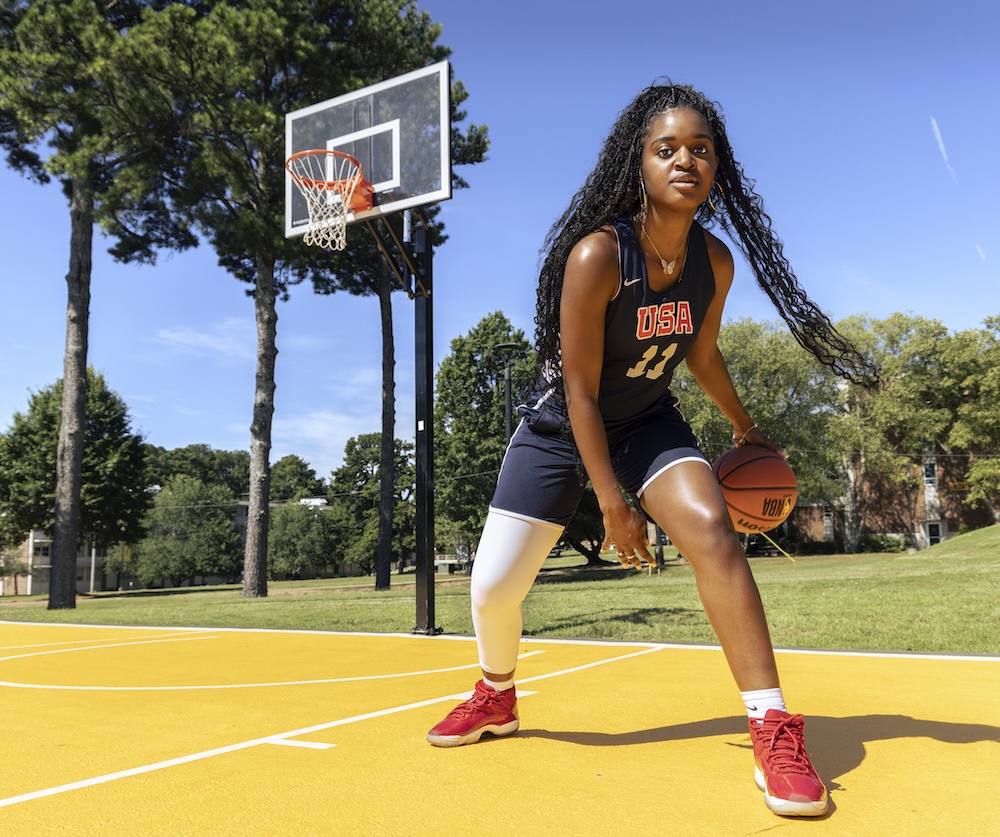

KENNESAW, Ga. | Jul 31, 2025

Occasionally, she says “Pardon?” when she needs a speaker to repeat what they’ve said. On the basketball court, communication was always much more fluid.
Since she began playing with her father and brothers as a child at the Boys and Girls Club, Rush’s hearing impairment has never hindered her. A native of Lawrenceville, Georgia, she went on to play for the Black Knights of Central Gwinnett High School. Two decades later, her abilities have earned her a spot on the USA Deaf Women’s Basketball team, which will compete in the Deaflympics in Tokyo over two weeks in November.
A 5-foot-10 forward, Rush was named to the team following a training camp tryout in Frederick, Maryland in March.
“This will be my first time competing with the USA Deaf Women’s Basketball team, and I’m so excited,” she said. “It’s an incredible opportunity to face off against some of the world’s best athletes—on a level playing field, without our disabilities holding us back.”
Rush’s disability never held her back at Kennesaw State University either. She graduated in May 2024 from KSU’s Michael J. Coles College of Business with a bachelor’s degree in marketing. She credits the Office of Student Disability Services (SDS) with helping her thrive as an Owl.
“As a hard-of-hearing woman, I would not have been able to succeed and graduate at KSU without the help of SDS,” Rush said. “SDS associate director Bonna Lenyszyn was instrumental in my success by helping me to access sign language interpreters, captioning services, and more.”
Paula Almond, director of SDS, said her unit serves approximately 3,200 students, roughly 6% of KSU’s total enrollment. To receive services, a student must request them and provide documentation of their disability. They are then assigned a disability services provider, who manages their case, and an accommodation plan is determined based on the student’s needs.
“SDS provides advocacy, academic coaching, assistive technology, note-taking, test proctoring for students with testing accommodations, consultation with faculty, outreach, and more,” she said.
Rush spent her first two years of college at Gallaudet University in Washington, D.C., which has served a mostly deaf and hard-of-hearing student body since its founding in 1864, and where she played on the women’s basketball team.
“I wanted to go to a college where my disability wouldn’t set me apart, so I went to Gallaudet,” she said. “After being immersed in deaf culture, learning sign language and playing basketball there for two years, I transferred to KSU.”
Rush said she loved living in D.C. but admits wanting to finish her undergraduate studies closer to home.
“While I was still in high school, I went on a tour of KSU, and the beauty of the campus, the endless amazing opportunities, and the familiar faces made it a priority destination for me when I decided to transfer,” she said. “Looking back, I’m glad I decided to become an Owl.”
– Story by Gary Tanner
Photos by Darnell Wilburn Jr.
A leader in innovative teaching and learning, Kennesaw State University offers undergraduate, graduate, and doctoral degrees to its more than 51,000 students. Kennesaw State is a member of the University System of Georgia with 11 academic colleges. The university's vibrant campus culture, diverse population, strong global ties, and entrepreneurial spirit draw students from throughout the country and the world. Kennesaw State is a Carnegie-designated doctoral research institution (R2), placing it among an elite group of only 8 percent of U.S. colleges and universities with an R1 or R2 status. For more information, visit kennesaw.edu.